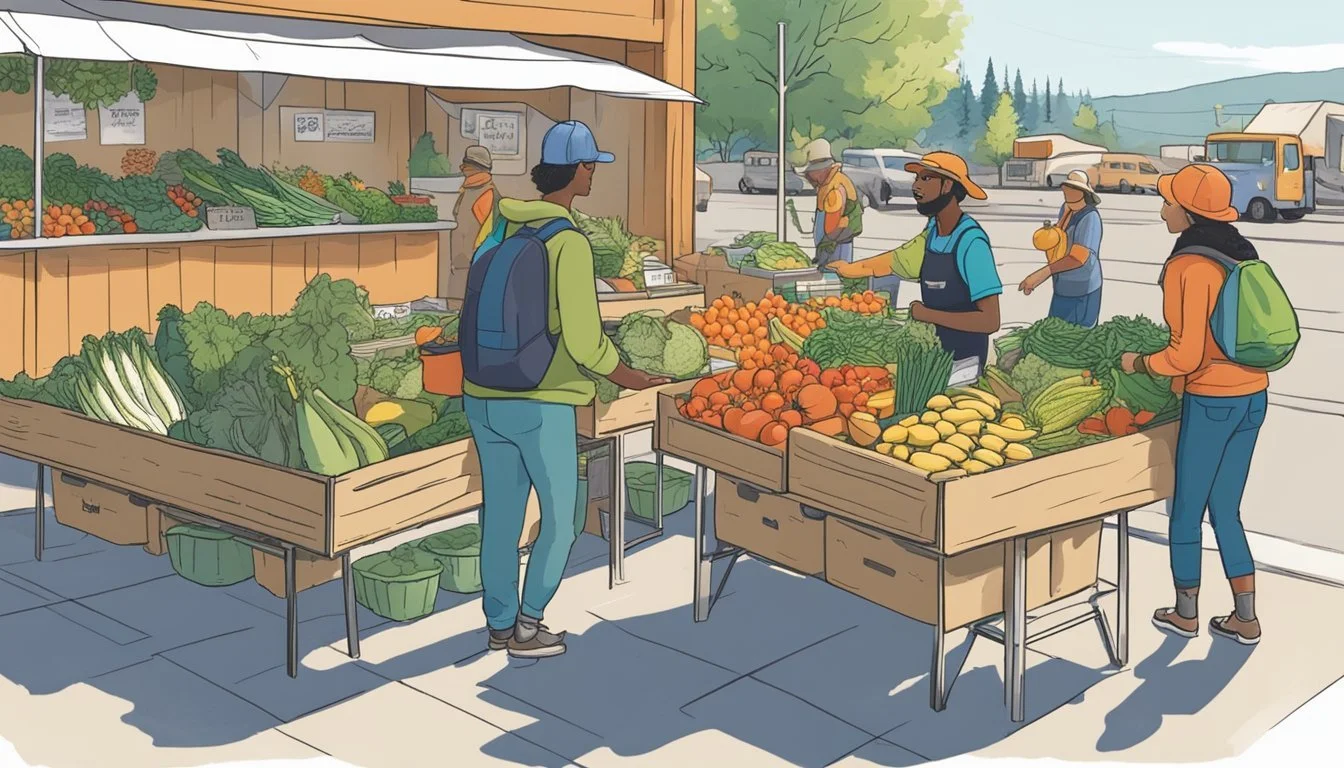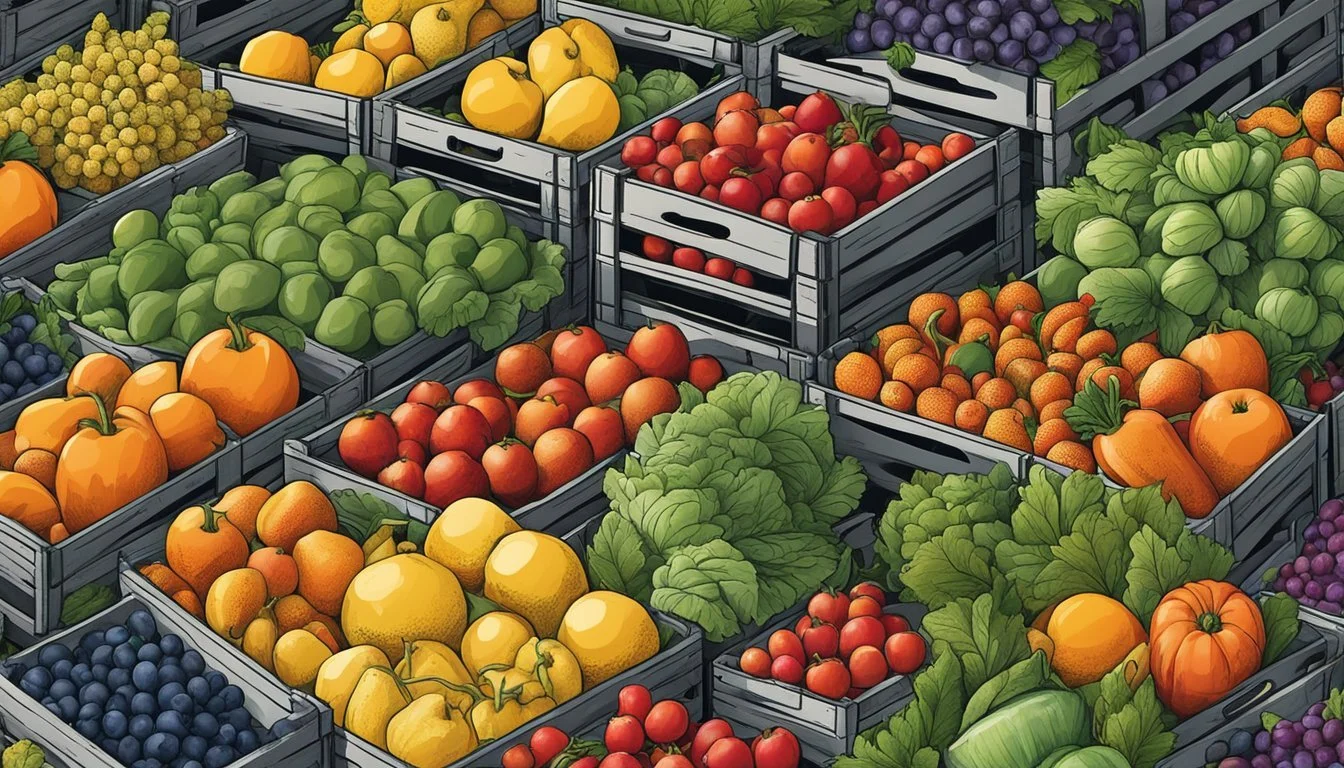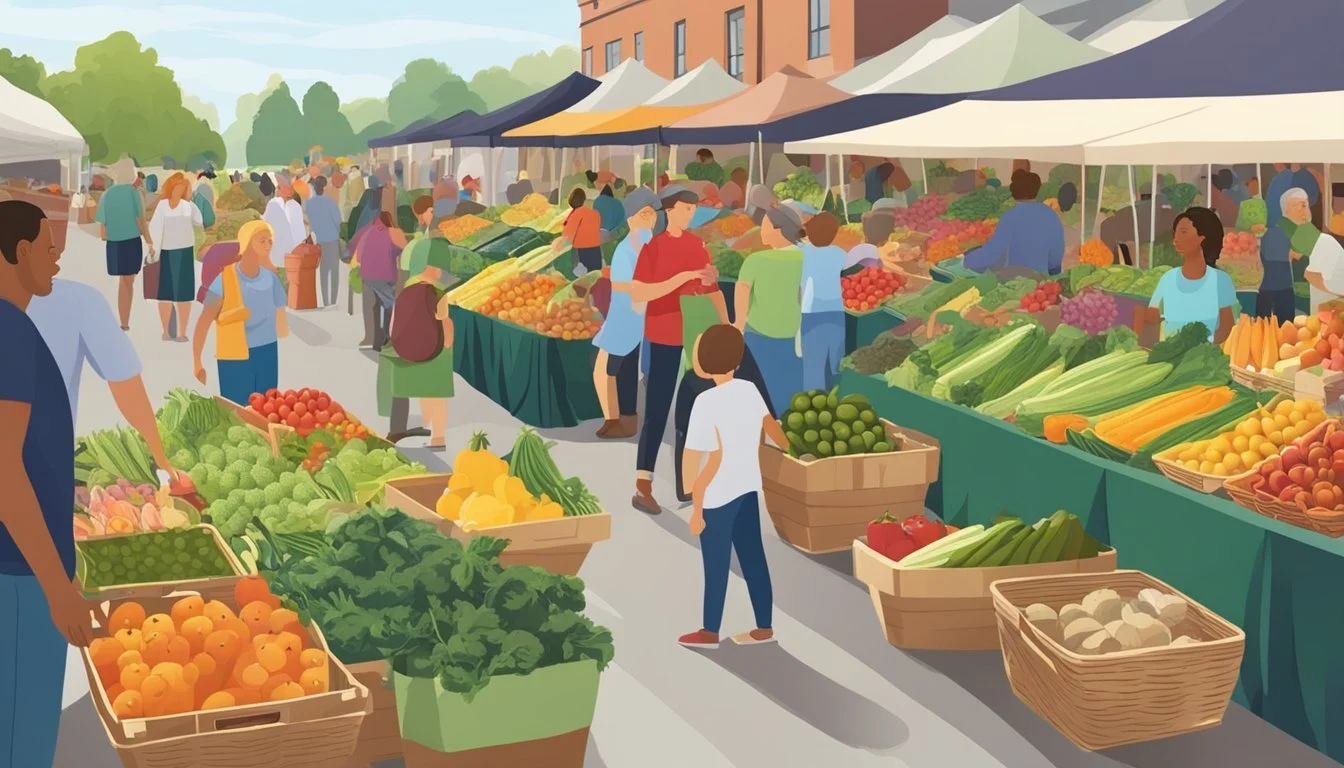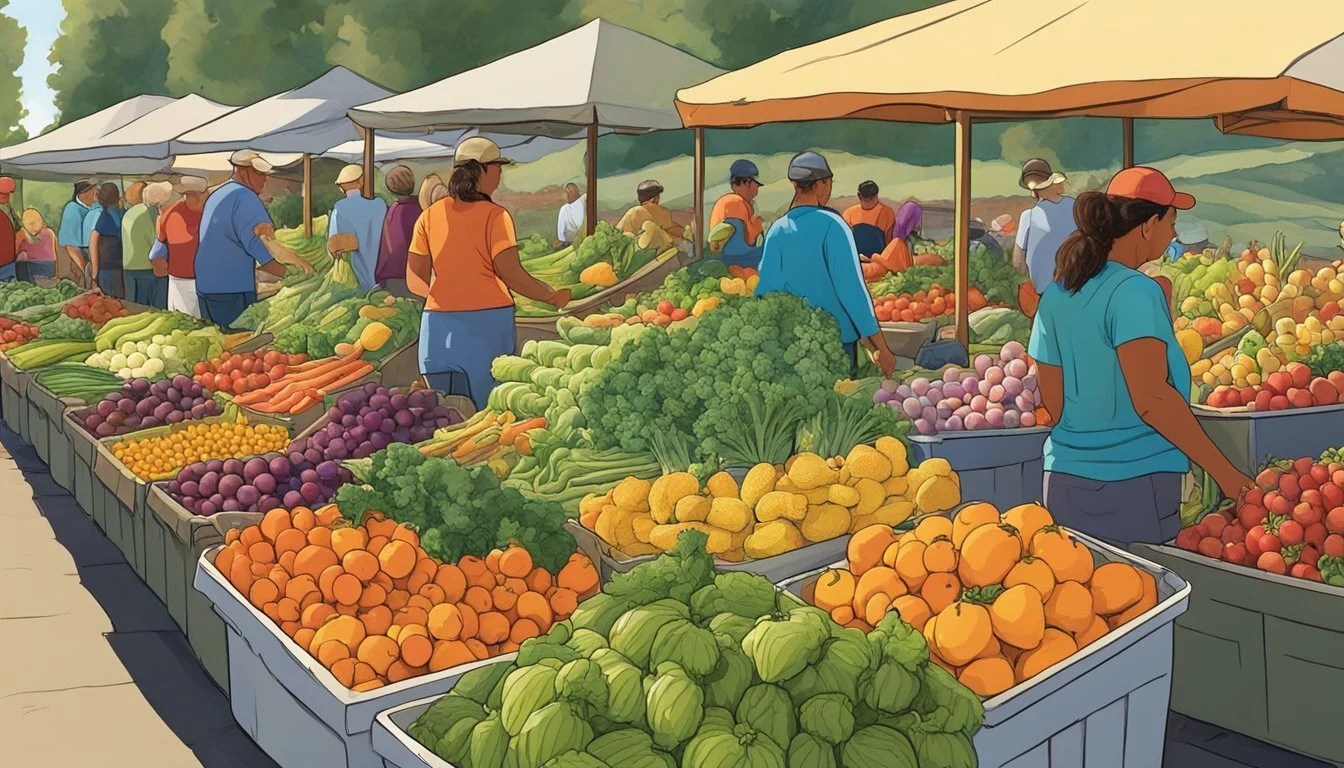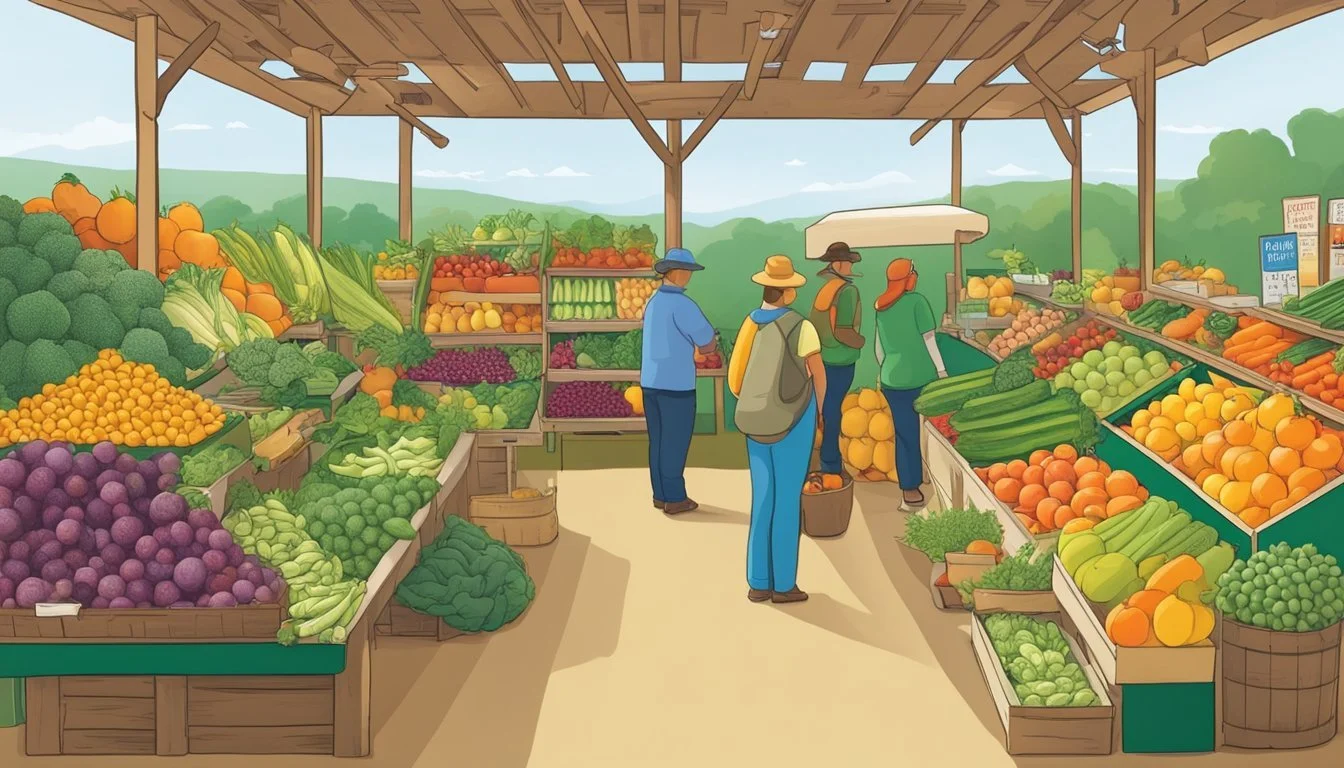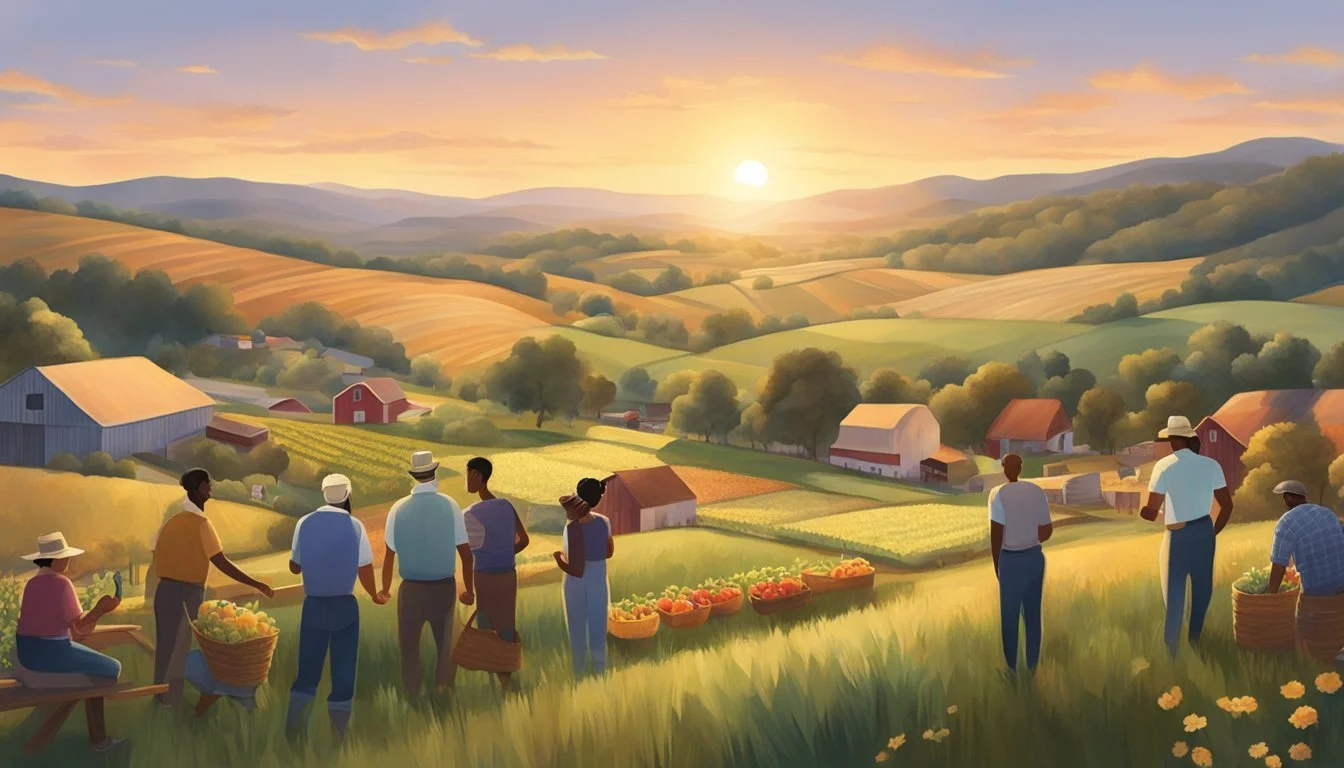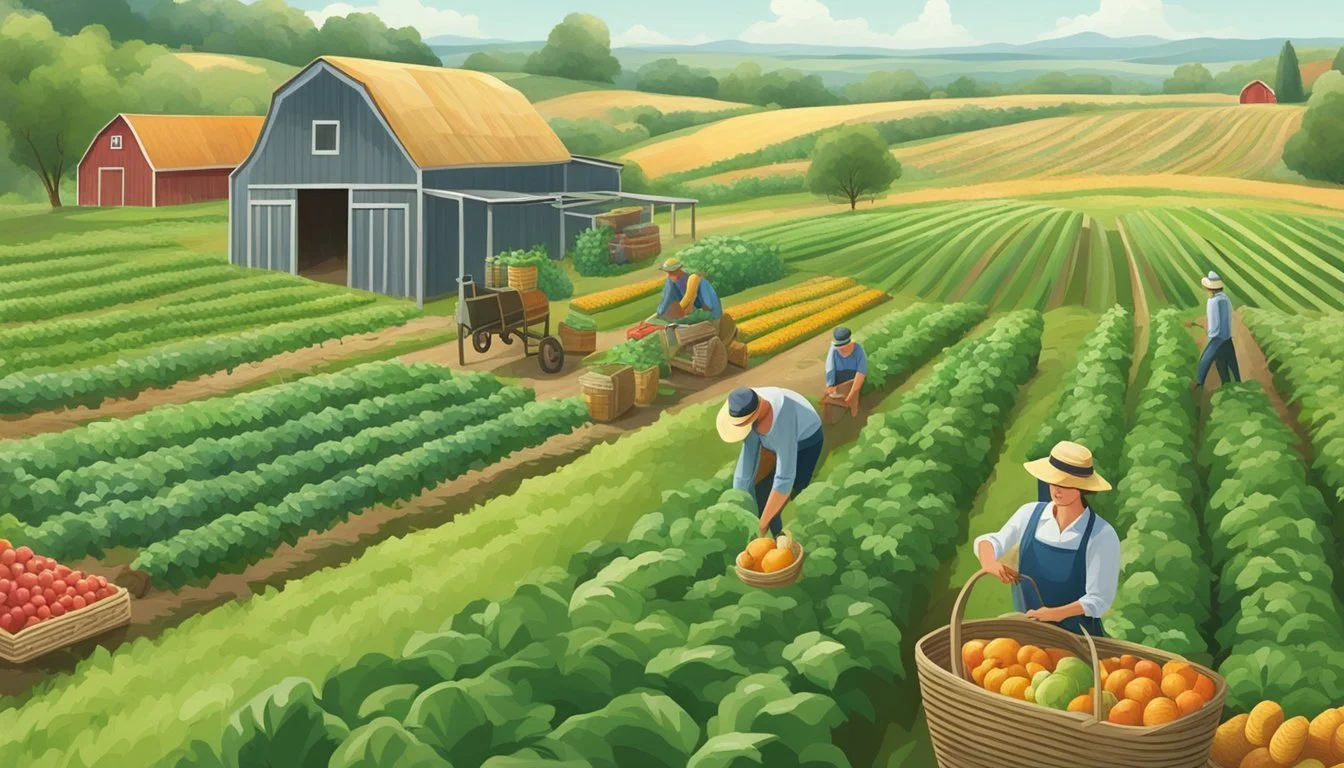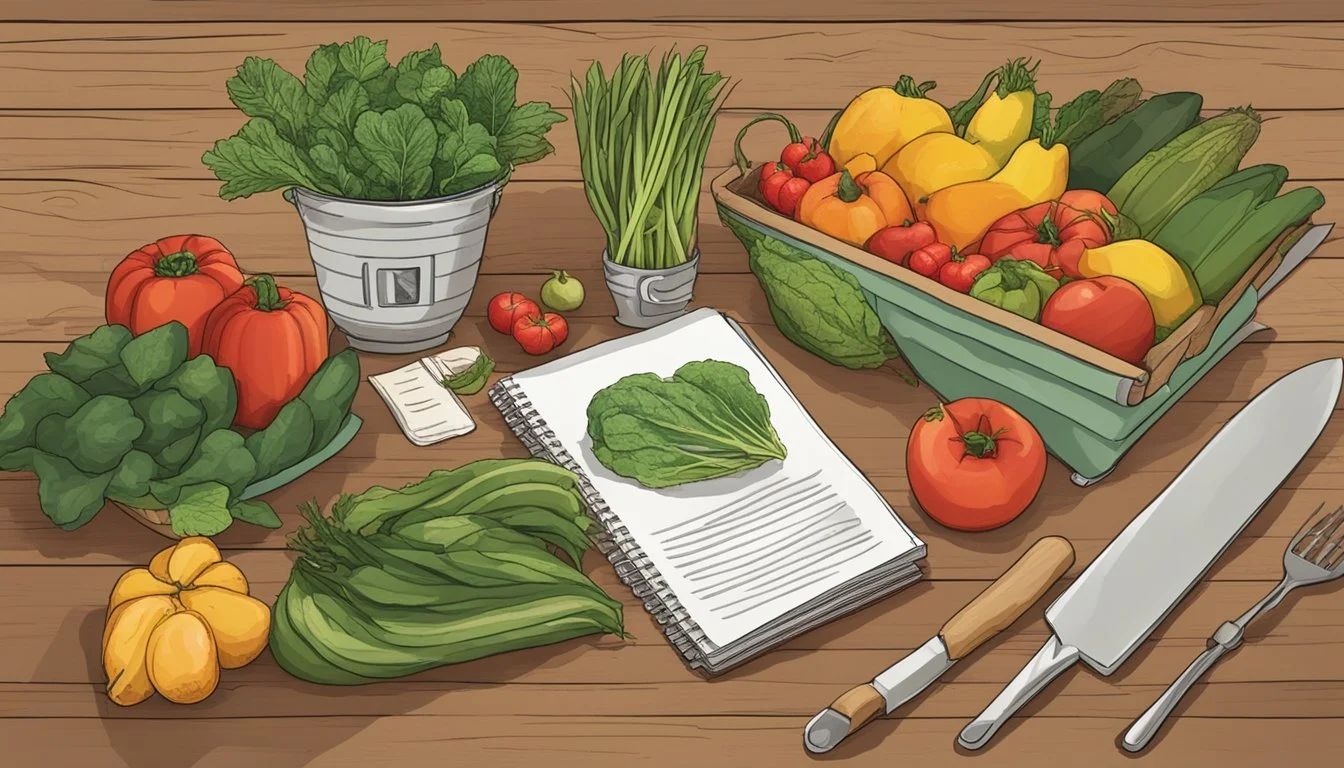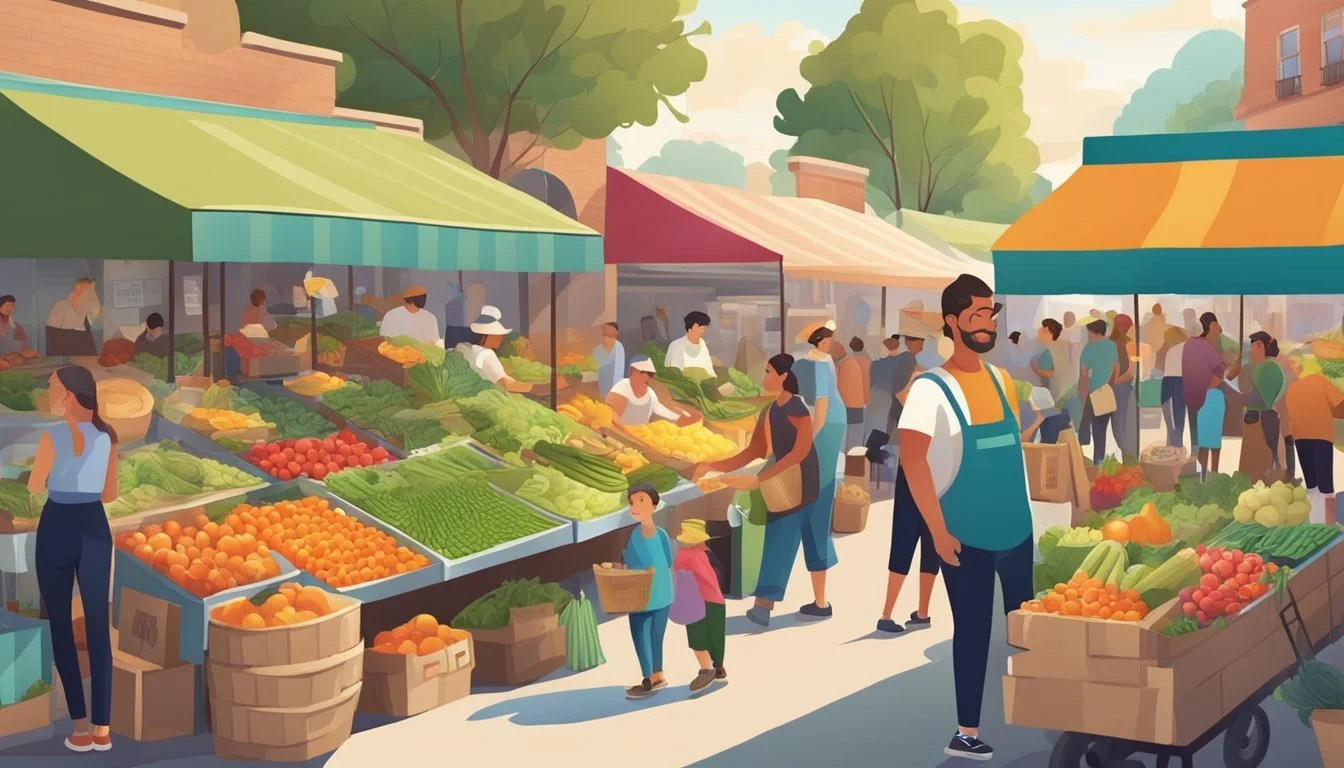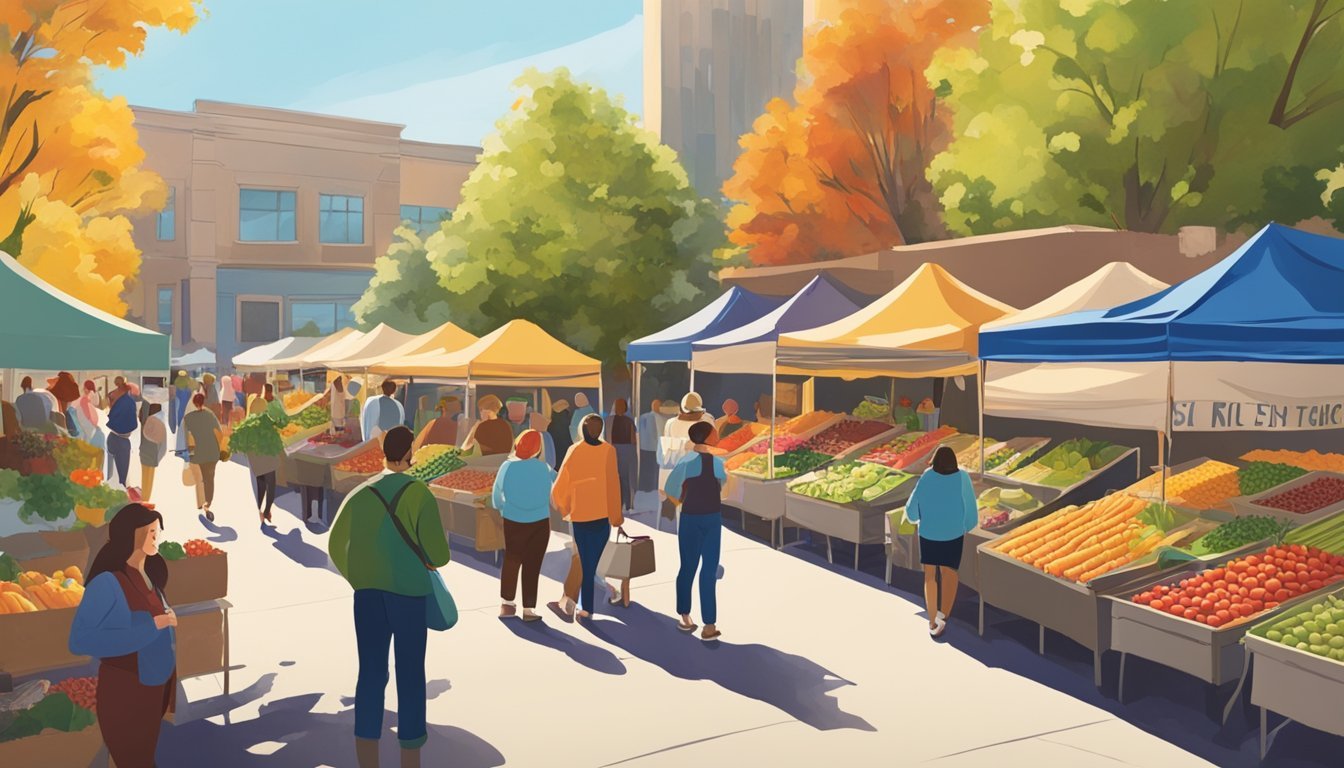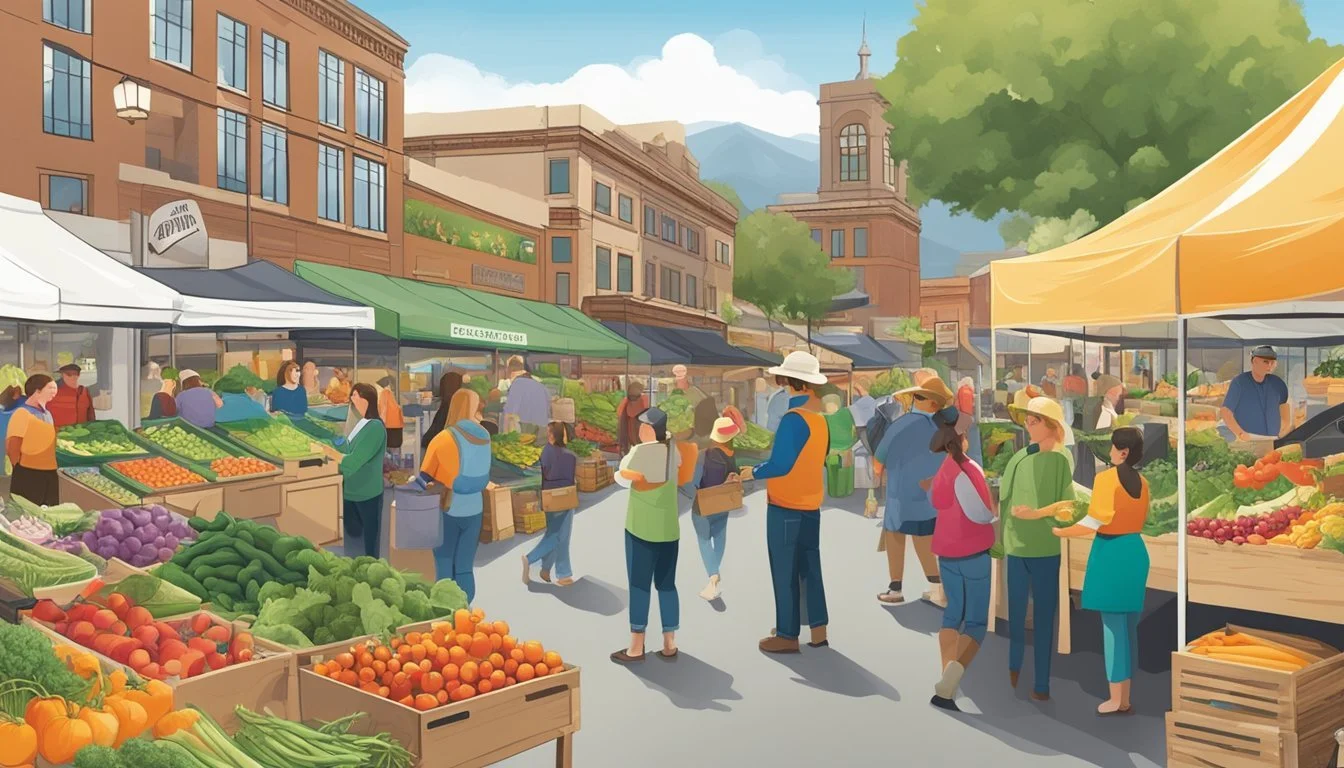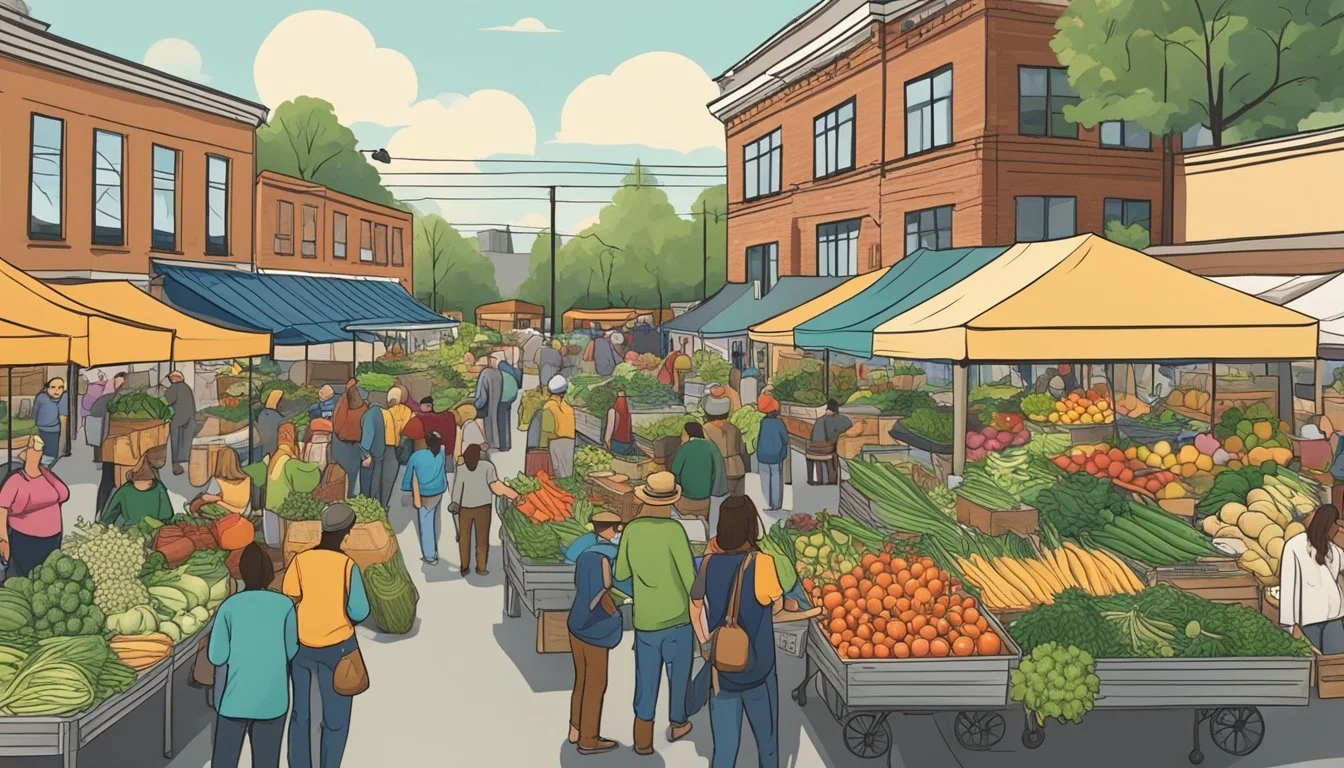Community Supported Agriculture (CSA) in Spokane, WA
A Guide to Local Farm Partnerships
Community Supported Agriculture (CSA) has been burgeoning in Spokane, WA, providing residents with an opportunity to partake in a system of food distribution anchored by local farms. CSAs represent a model where consumers buy shares from a farm and in return, receive a portion of the harvest throughout the growing season. This farm-to-table approach not only fosters a deeper connection between consumers and their food sources but also supports local agriculture by guaranteeing income for farmers.
Spokane's CSA programs offer a diverse range of produce shares to community members, often starting in early June and continuing until late September or early October. Participating in a CSA allows Spokane residents to access fresh, seasonal vegetables and fruits, while also exploring less common varieties grown within their local agricultural landscape. By committing to a full or half season share, individuals can enjoy a steady supply of locally grown produce, directly benefitting from the region's fertile land and farmers' agricultural expertise.
Several farms around Spokane have established a loyal customer base for their CSA programs, with options ranging from weekly produce boxes to winter shares packed with staple items. These programs not only provide residents with a reliable source of fresh produce but also invite them to become integral members of their local food system. Spokane's CSAs are more than just a means of obtaining food; they represent a commitment to sustainability, community engagement, and the preservation of small-scale farming.
Understanding CSA
Community Supported Agriculture (CSA) in Spokane, WA, represents a thriving partnership between local farmers and the community. This collaboration allows residents to partake in fresh, local produce, while supporting regional agriculture.
History of CSA in Spokane, WA
The inception of CSA programs in Spokane traces back to a community-driven inclination towards sustainability and supporting local farms. As residents saw the value in having direct access to high-quality, seasonal food, the popularity of CSA programs grew. These initiatives not only bolster the local economy but also encourage sustainable farming practices.
CSA Program Fundamentals
At the core of a CSA program are shares, which are essentially portions of the season's harvest pre-purchased by the community members. A typical CSA share includes a variety of vegetables, fruit, meat, eggs, and sometimes flowers. Participants typically join a CSA by subscribing at the beginning of the growing season.
Delivery and pick-up options are structured to accommodate members:
Delivery: Some CSAs offer delivery to your doorstep or a convenient drop-off location.
Pick-up: Members can visit the farm or a specified location to collect their shares.
By joining a CSA, individuals ensure their direct support to local agriculture, secure a source of fresh, seasonable produce, and foster a stronger community bond.
Benefits of Joining a CSA
Joining a Community Supported Agriculture (CSA) program in Spokane, WA, offers a tapestry of benefits, ranging from positive environmental impacts, to economic advantages for local farmers, and health benefits for consumers seeking fresh, nutrient-dense food.
Environmental Impact
CSAs play a critical role in minimizing the carbon footprint of agriculture. By supporting local farms, members reduce the need for long-distance transportation of produce, which cuts down on the emission of greenhouse gases. Moreover, CSAs often employ organic farming practices, which encourage soil health and biodiversity, eschewing the use of harmful chemicals that can damage the environment.
Economic Advantages
When consumers commit to a CSA, they are investing directly in local agriculture, which can help to bolster the local economy. This direct infusion of funds allows farmers to plan their seasons with more certainty and reduce waste by growing the amount of produce they know they can sell. Financial support from CSAs can help sustain smaller farms, which might otherwise struggle to compete with larger agribusinesses.
Health and Nutrition Benefits
Members of a CSA reap the benefits of consuming fresh, organic veggies that are often more nutrient-dense than those found in conventional grocery stores. The produce is harvested at its peak, which maximizes both flavor and nutritional value. Since CSAs typically emphasize chemical-free farming, consumers avoid synthetic pesticides and fertilizers, thereby benefiting from healthy produce that supports overall well-being.
Local CSA Farms
Community Supported Agriculture in Spokane, WA, connects residents with an abundance of fresh, locally-grown produce and farm products. This section delves into the CSA scene, profiling key farms, exploring organic options, and showcasing the variety of produce available to Spokane locals.
Profiles of Key Spokane Farms
Tolstoy Farms has a longstanding presence in the Spokane CSA landscape, providing full and half veggie shares. Celebrating over 25 years of operation, they stand as a testament to the sustainability and endurance of local farming practices. Agape Farm and Elithorp Farm round out the vibrant community, each contributing unique offerings to the local market.
Spotlight on Organic Options
Organic farming is a hallmark of Spokane's CSA offerings. Tolstoy Farms and others like Dancing Goats and Singing Chickens Organic Farm highlight their commitment to sustainable, chemical-free farming. They offer a diverse range of organic produce, ensuring that members receive the healthiest food grown with the environment in mind.
Variety of Produce Available
Spokane's CSAs offer an impressive array of produce, ranging from staples like tomatoes, carrots, and corn, to unique varieties of berries and flowers. Farms often provide an assortment of proteins, including beef, chicken, pork, turkey, and duck, along with farm-fresh eggs for well-rounded nutrition. Fruits such as apples, and vegetables like garlic, are also commonly featured.
Local CSA farms like LINC Foods connect small farms to larger markets, expanding the reach of these diverse, fresh products.č
Seasonal Availability
In Spokane, WA, CSA participants can look forward to a diverse range of seasonal offerings, from fresh greens in the spring to hearty root vegetables in winter. The carefully curated selection evolves with the seasons, ensuring that members receive the highest quality produce at its peak.
Spring Harvest Offerings
Spring in Spokane ushers in delicate greens, radishes, and peas. These crops grow well in the cooler temperatures and tend to be ready for harvest from early to late spring:
Herbs: chives, parsley, cilantro
Greens: lettuce, spinach, arugula
Vegetables: radishes, peas, spring onions
Summer Abundance
The summer months bring a bountiful variety of produce. Members can relish the taste of sun-ripened fruits and a wide array of vegetables such as summer squash, beans, and peppers:
Vegetables: zucchini, cucumber, green beans, bell peppers
Fruits: strawberries, cherries, raspberries
Herbs: basil, dill, mint
Fall Harvest and Preparations
Fall is a time for harvest and preparation. Spokane CSA providers offer pumpkins, onions, and potatoes, along with other crops that store well into the colder months:
Root vegetables: beets, carrots, turnips
Squash: acorn, butternut, spaghetti
Greens: kale, Swiss chard, collard greens
Winter CSA Options
During winter months, some Spokane CSAs offer shares focused on storage vegetables and hearty staples. These often include potatoes, onions, and winter squash, as well as preserved or greenhouse-grown items:
Root vegetables: potatoes, onions, garlic
Winter squash: pumpkin, butternut, delicata
Preserved goods: apple sauce, pickles, dried herbs
Each season has its own unique charm and flavor profile, with CSA shares transforming to match the productive rhythm of nature.
CSA Membership and Community
In Spokane, WA, CSA programs forge a vital connection between local farms and community members who wish to support and participate in local agriculture. Becoming a CSA member entails a seasonal commitment, which includes regular pickups of locally grown produce and often involves involvement in community events.
How to Join a CSA
Individuals interested in joining a CSA in Spokane can begin by researching different CSA options offered by local farms. Key steps in the enrollment process include:
Identifying local CSAs: Utilize resources such as LocalHarvest or Washington Farm Share directories to find CSAs.
Checking availability: Contact the CSA for current availability, as some have waiting lists or limited member spots.
Selecting share size: Determine whether a full or half-share best suits your needs—full shares often provide a week’s worth of produce for a family, while half-shares are suitable for smaller households or those new to CSAs.
Reviewing pickup locations and schedules: Ensure that the drop-off points and times fit into your routine.
Signing up: Fill out any necessary forms and pay the subscription fee to secure your membership.
Understanding Membership Commitments
Membership typically includes a pre-payment for the duration of the growing season, which may run from early June until late September or early October in Spokane. Members' commitments often include:
Financial: Paying the season’s fee upfront helps support farmers with their early-season costs.
Pickup: Regularly collecting the CSA shares, as missed pickups can equate to food waste or lost value.
Flexibility: Being open to a varied selection of produce that changes with the growing season.
Community engagement: Participating in CSA-related activities or volunteer opportunities.
Community Engagement and Events
CSAs in Spokane actively encourage members to engage beyond just receiving produce. Opportunities for community involvement can include:
Farm visits: Some CSAs offer tours or volunteer days, allowing members to experience farming firsthand.
Events: Seasonal events such as harvest festivals, cooking classes, or potlucks can be organized for members.
Feedback: Providing feedback to the farmers on produce selections and services can help improve the CSA experience for all members.
Agricultural Practices
Community Supported Agriculture (CSA) in Spokane emphasizes the use of environmentally friendly agricultural practices. These practices ensure that the vegetables are not only grown locally but also support the ecological balance and long-term sustainability of the farming operations.
Organic Farming Methods
Organic farming is integral to many Spokane CSAs. This approach eschews chemical fertilizers and synthetic pesticides, focusing instead on natural methods to enhance soil fertility. For instance, the use of composted plant materials enriches the soil, providing essential nutrients for organic veggies. Crop rotation is another common practice, crucial for maintaining the soil's health and minimizing pest buildup.
Sustainable Agriculture Techniques
In Spokane's CSA programs, sustainable agriculture techniques embody a commitment to the land and local community. Farmers adopt conservation tillage methods to reduce erosion, protecting water quality in the process. Locally grown produce results in lower carbon emissions due to reduced transportation requirements. Integrated water management ensures resources are used judiciously, supporting sustainable vegetable production throughout the region.
Pest and Disease Management
Effective pest and disease management in Spokane's CSA operations often involves a combination of biological and cultural strategies. Instead of relying on chemical herbicides, growers introduce beneficial predators that naturally control pest populations. Thorough monitoring and the use of disease-resistant crop varieties help prevent outbreaks. Such practices are designed to safeguard crops while preserving the surrounding ecosystem.
Food Preparation and Recipes
Community Supported Agriculture (CSA) in Spokane provides an abundance of fresh produce and more, which can be transformed into nourishing and seasonal meals. This section outlines how one can utilize their CSA produce and provides specific recipes to harness the peak flavors of each season.
Using Your CSA Produce
When incorporating CSA produce into daily meals, it's essential to consider the freshness and variety of the items received. Vegetables and fruits from CSA boxes, like carrots, berries, tomatoes, and corn, should be used when they are at their freshest to maximize their natural flavors. One can store carrots and corn in the crisper drawer of their refrigerator to maintain their crispness. Berries need to be kept dry and refrigerated, often in their original container. Items such as garlic and potatoes can be stored in a cool, dark place to extend their shelf life.
For those that receive eggs, beef, or chicken in their CSA, proper storage is equally important. Eggs should be kept in their carton and stored in the main body of the fridge where the temperature is most consistent. Beef and chicken should be refrigerated or frozen immediately, depending on when one plans to use them. If flowers are included, they brighten up any space while fresh and can also be dried for lasting enjoyment or culinary uses, particularly if they are edible varieties.
Seasonal Recipes and Preparations
Creating recipes with seasonal produce ensures the best in flavor and nutrition. Spokane's CSA programs provide a range of produce that can inspire a variety of dishes.
Spring: Utilize tender greens and garlic in a simple stir-fry, or incorporate fresh eggs into frittatas with seasonal vegetables.
Summer: Blend berries into smoothies or fold them into yogurt. Make vibrant salads with tomatoes and corn.
Fall: Roast carrots and other root vegetables with a drizzle of olive oil and a sprinkle of fresh herbs.
Winter: Prepare hearty stews and soups using stored produce like potatoes and frozen items from the summer harvest.
Here are specific recipes one can try:
Season Recipe Name Key Ingredients Spring Garlic Greens Frittata Eggs, garlic, spinach Summer Berry Burst Smoothie Mixed berries, yogurt, honey Fall Roasted Carrot Harvest Salad Carrots, mixed greens, nuts Winter Hearty Winter Stew Beef, onions, root vegetables
By incorporating these given ideas and recipes into their meal planning, CSA members in Spokane can enjoy a full range of culinary delights that make the most of their fresh, local produce.
Supporting Local Agriculture
Community Supported Agriculture (CSA) programs and farmers' markets play a pivotal role in bolstering Spokane's local food system, empowering Eastern Washington's agricultural base, and reinforcing the Spokane Valley's economy. These initiatives are instrumental in connecting consumers to the source of their food, fostering education on sustainable practices, and galvanizing community spirit through involvement.
Farmers' Markets and Local Economy
Farmers' markets in Spokane act as vital conduits for local farms to sell fresh, seasonal produce directly to the community. The presence of markets such as the Spokane Farmers' Market not only incubates economic growth in the Spokane Valley but also ensures that the revenue generated remains within the local community. LINC Foods, a regional food hub, supports these markets by facilitating a network that helps distribute locally grown food, thereby strengthening the connection between producers and consumers in Eastern Washington.
Educational Opportunities and Workshops
Local farms often extend beyond just providing food; they serve as centers for education and shared knowledge. Through workshops and CSA programs, farms become platforms for learning about sustainable agriculture, organic farming techniques, and the nuances of local food production. These opportunities are essential in building an informed populace that appreciates the intricacies of their food systems and is invested in the health of their environment.
Volunteerism and Community Support
The success of a CSA is not only measured by its produce but also by the level of community engagement it fosters. Volunteering at local farms or participating in CSA programs exemplifies community support and allows individuals to contribute directly to their local food system. It's an effort that unites Spokane residents and farmers in a mutual goal: the pursuit of a robust, sustainable, and community-centric agriculture model. Through these collective efforts, individuals not only sustain their local farms but also cultivate a deeper connection with their food and each other.
Specialized CSA Programs
Community Supported Agriculture in Spokane, WA, offers a diverse range of specialized programs catering to individuals interested in niche market items such as specialty meats, heirloom produce, and dairy products.
Meat Shares and Livestock Options
In Spokane, subscribers to CSA programs can access a range of meat shares that include beef, chicken, pork, turkey, and duck. Local farms provide an opportunity for consumers to receive regular distributions of sustainably and humanely raised livestock products. Some CSAs offer full and half veggie shares supplemented by meat options, allowing flexibility for families of different sizes and dietary preferences.
Beef: Often grass-fed and finished, offering robust flavors.
Poultry: Can include a variety of birds beyond chicken, such as turkey and duck.
Pork: Heritage breeds may be a highlight, prized for their taste.
Dairy: Shares may include milk, cheese, and other dairy products from local herds.
Rare Varieties and Heirloom Produce
CSAs in Spokane take pride in growing and including rare varieties and heirloom produce in their shares. These selections often boast superior flavor and nutritional profiles compared to conventional counterparts. Farmers cultivate these crops with careful attention to sustainable practices, often without the use of harmful chemicals. This commitment not only preserves agricultural diversity but also provides members with unique culinary experiences.
Heirloom vegetables: Tomatoes, peppers, and more with historic lineage.
Rare fruits: Unique apples, pears, and stone fruits that are locally adapted.
Dairy and Specialty Products
For those with interest in dairy products or other specialty items, Spokane's CSAs offer various options. Fresh, local dairy products like milk, cheese, and yogurt may be available through these programs. In addition, some farms provide eggs from free-range chickens or add-ons like homemade jams, honey, and artisanal bread, further supporting the local food ecosystem.
Eggs: Often from chickens raised on pasture, with access to quality feed.
Dairy Products: Can include a range of cheeses, from soft to hard-aged varieties.
These specialized CSA programs in Spokane not only focus on the freshness and variety of their produce but also emphasize the importance of community and sustainable farming practices. They strive to create a meaningful connection between local farmers and consumers.
Testimonials and Case Studies
In Spokane, WA, Community Supported Agriculture (CSA) has a strong presence with positive feedback from its members and success stories from local farms. This section explores firsthand experiences and achievements within the CSA community.
Member Experiences
Members of Spokane's CSA programs often share enthusiastic testimonials about their participation. They typically highlight the freshness and variety of produce received throughout the seasons. One member mentioned the convenience and joy of weekly pre-packed produce boxes, which offered an assortment of seasonal vegetables that enhanced their home cooking and supported better eating habits. Moreover, many members appreciate the direct relationship with farmers and the sense of community fostered through the CSA.
Feedback Examples:
"The weekly produce boxes were a game changer for our family's diet."
"Being part of the CSA feels like I'm truly supporting local agriculture and I love that."
Farm Success Stories
Local Spokane farms that engage in CSA programs report numerous benefits, including a stable customer base and a reliable sales outlet for their produce. For instance, some farms boast programs running for over 25 years, demonstrating longevity and sustainability in their business models. They have also been successful in creating and sustaining relationships with close to 75 CSA members, which is a testament to their commitment and quality of produce.
Notable Achievements:
Sustainable member base of nearly 75 customers.
Over 25 years of continuous CSA program operation.
Future of CSA in the Inland Northwest
The Inland Northwest's agricultural scene is progressively being shaped by Community Supported Agriculture (CSA), combining traditional farming practices with innovative models to foster a sustainable food future.
Emerging Trends in CSA Model
The CSA model in the Inland Northwest is witnessing a gradual shift towards a more diverse and flexible system. Local farms are increasingly adopting practices that allow for customization of produce boxes, giving consumers the ability to tailor their CSA shares according to their preferences. This customization trend is not only enhancing the customer experience but also reducing food waste associated with unwanted items.
Challenges and Opportunities
CSAs in the region face challenges such as climate variability and the need to balance market demands with sustainable practices. However, these challenges are met with opportunities through agricultural innovation. Farmers are exploring water-efficient methods and diversifying crops to ensure year-round productivity and resilience. The CSA model inherently promotes a closer relationship between consumers and local farmers, fostering a community engaged in the challenges faced by agriculture in the Inland Northwest.
Long-Term Outlook
Looking ahead, the future of CSAs in the Inland Northwest appears promising. There is a continued emphasis on building a robust local food system that supports both the economy and the environment. Community supported agriculture is poised to grow, potentially becoming a cornerstone of the regional food landscape, as it strengthens ties between the people and the land that sustains them.
Additional Resources
In Spokane, those interested in Community Supported Agriculture (CSA) have a variety of resources at their disposal to deepen their understanding and engagement with local food systems.
Relevant Books and Publications
Books:
Local Dirt: Seasonal Recipes for Eating Close to Home by Andrea Bemis
The CSA Cookbook: No-Waste Recipes for Cooking Your Way Through a Community Supported Agriculture Box, Farmers' Market, or Backyard Bounty by Linda Ly
Publications:
Inland Northwest Food Network's publication features stories and insights on the local food scene.
The Spokane Coeur d'Alene Living magazine occasionally profiles local farms and CSAs.
Educational Websites and Forums
Websites:
LocalHarvest.org provides a wealth of information on CSAs across the country, including those in Spokane.
WA Farm Share (wafarmshare.org) is a helpful resource for locating and understanding the specifics of CSAs in Washington State.
Forums:
The Farmers' Market section on Spokane's Reddit page often has discussions on CSA experiences.
Ag-related threads on City-Data.com's Spokane forum can offer community insights and recommendations.
Local Workshops and Classes
Workshops:
Spokane's Second Harvest hosts cooking and nutritional classes that can be beneficial for CSA members looking to make the most out of their produce.
Extension programs through Washington State University often include workshops on sustainable farming and CSA management.
Classes:
Spokane area community colleges offer continuing education courses in horticulture and sustainable agriculture.
The Inland Northwest Food Network organizes events and classes focusing on local food systems and CSAs.

